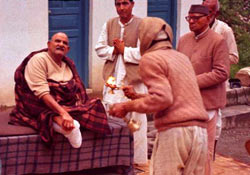How We Do Aarti - Vrindavan - 5 Videos
 Aarti is practiced every day, morning and evening, at all the temples in Maharajji's ashrams.
Aarti is practiced every day, morning and evening, at all the temples in Maharajji's ashrams.
This is the Aarti practice done at the Mahasamdhi Temple of India's great saint Neeb Karoli Baba / Neem Karoli Baba Maharajji in Vrindavan, India on the morning of Hanuman Jayanti in 1999.
Aarti is said to have descended from the Vedic concept of fire rituals, or homa. In the traditional aarti ceremony, the flower represents the earth (solidity), the water and accompanying handkerchief correspond with the water element (liquidity), the lamp or candle represents the fire component (heat), the peacock fan conveys the precious quality of air (movement), and the yak-tail fan represents the subtle form of ether (space). The incense represents a purified state of mind, and one’s "intelligence" is offered through the adherence to rules of timing and order of offerings. Thus, one’s entire existence and all facets of material creation are symbolically offered to the Lord via the aarti ceremony. (Wikipedia)
Aarti is offered to Maharajji with the Utmost Love and Gratitude.
In Part 1, you will hear the bell aarti.
This aarti begins at Maharajji's mahasamadhi mandir, moves to Maharajji's Kutir, then moves to Shivaji temple, then salutes Tulsi plant and returns to Maharajji's temple.
In Part 2, you will hear the singing of Sri Guru Vandana and Vinaya Chalisa.
Vinaya Chalisa is 40 Verses in Praise of Maharajji.
In Part 3, you will hear the singing of Sri Guru Stotra.
The Sri Guru Stotra is a sanskriit chant of praise to to Guru and is sung while sitting
In Part 4, you will hear the singing of Jaya Gurudev.
Jaya Gurudev is sung standing and walking, beginning in front of Maharajji's temple, proceeding through several circumambulations around Maharajji's Mahasamadhi Temple, finally ending in front of the temple.
In Part Five, you will hear Sri Ram Jai Ram.
The Sri Ram Jai Ram kirtan is sung seated, and is followed by salutations and distribution of prasad.
